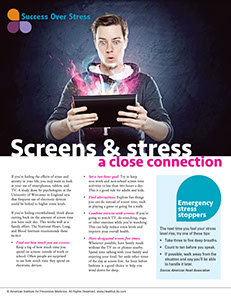SYMPTOM CHECKER
CONDITIONS
Male
Female
Child
Arm, Hand & Shoulder Concerns
Legs & Feet Concerns
Dental & Mouth Concerns
Ear & Nose
Eye Conditions
Head Conditions
Arm, Hand & Shoulder Concerns
Legs & Feet Concerns
Front
Back
Arm, Hand & Shoulder Concerns
Dental & Mouth Concerns
Ear & Nose
Eye Conditions
Head Conditions
Arm, Hand & Shoulder Concerns
Dental & Mouth Concerns
Ear & Nose
Eye Conditions
Head Conditions
Front
Back
Arm, Hand & Shoulder Concerns
Neck Links
Head & Neck Concerns
Arm, Hand & Shoulder Concerns
Neck Links
Head & Neck Concerns
Front
Back
Online Clinic
Wise Healthcare
Screens & stress a close connection
Print on Demand
If you’re feeling the effects of stress and anxiety in your life, you may want to look at your use of smartphones, tablets, and TV. A study done by psychologists at the University of Worcester in England says that frequent use of electronic devices could be linked to higher stress levels.
If you’re feeling overwhelmed, think about cutting back on the amount of screen time you have each day. This works well as a family effort. The National Heart, Lung, and Blood Institute recommends these tactics:
• Find out how much you use screens. Keep a log of how much time you spend on screens outside of work or school. Often people are surprised to see how much time they spend on electronic devices.
• Set a two-hour goal. Try to keep non-work and non-school screen time activities to less than two hours a day. This is a good rule for adults and kids.
• Find alternatives. Explore fun things you can do instead of screen time, such as playing a game or going for a walk.
• Combine exercise with screens. If you’re going to watch TV, do stretching, yoga, or other exercises while you’re watching. This can help reduce stress levels and improve your overall health.
• Have designated screen-free times. Whenever possible, have family meals without the TV on or phones nearby. Spend time talking with your family and enjoying your food. Set aside other times of the day as screen-free. An hour before bedtime is a good choice to help you wind down for sleep.
Emergency stress stoppers
The next time you feel your stress level rise, try one of these tips:
• Take three to five deep breaths.
• Count to ten before you speak.
• If possible, walk away from the situation and say you’ll be able to handle it later.
Source: American Heart Association
This website is not meant to substitute for expert medical advice or treatment. Follow your doctor’s or health care provider’s advice if it differs from what is given in this guide.
The American Institute for Preventive Medicine (AIPM) is not responsible for the availability or content of external sites, nor does AIPM endorse them. Also, it is the responsibility of the user to examine the copyright and licensing restrictions of external pages and to secure all necessary permission.
The content on this website is proprietary. You may not modify, copy, reproduce, republish, upload, post, transmit, or distribute, in any manner, the material on the website without the written permission of AIPM.
2021 © American Institute for Preventive Medicine - All Rights Reserved. Disclaimer | www.HealthyLife.com

















































